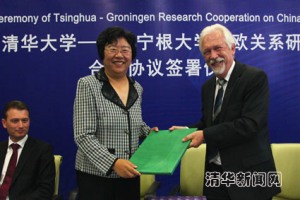New academic centre strengthens link between Tsinghua University and the University of Groningen

The University of Groningen has had a Dutch Studies Centre at Fudan University in Shanghai since 2005. Both universities, Tsinghua and Fudan, are among the absolute top of academic education institutes in China. ‘I am delighted that we have been able to establish such in-depth cooperation with these two universities in particular’, says Groningen professor of History and Theory of European Integration Jan van der Harst. In addition to his position in Groningen, Prof. van der Harst is academic director of the centres in China.
Cooperation
The two institutes will offer intensive courses. ‘However, just as at Fudan University, we are going to use the new centre in Beijing to set up PhD projects and organize conferences’, says Van der Harst, outlining the future prospects. ‘Many universities across the world have memoranda of understanding with these two universities. However, only genuine cooperation strengthens the link and results in development. This is what this kind of centre is designed to do.’
Fully booked
The China-Netherlands relationship is central to the study centre in Shanghai. ‘That suits that city’, thinks Van der Harst. ‘The Dutch presence is significant there, and Dutch business is well represented.’ The lectures for students of economics and law that he gives with Groningen colleagues are fully booked every year.
Wider focus
He expects the same level of interest at the new centre at Tsinghua University. With the topics of Europe and China-EU relations, that institute will have a wider focus. Van der Harst will teach courses to students who are following a degree in International Relations. ‘There is a lot of interest in China in European unification, and in the problems we are currently experiencing. In the past they have had a lot of experience and many contacts with the USA. Europe is relatively new for them and they are naturally used to looking at these types of issues in a completely different way. You notice that they are following the developments here with great interest.’
Mutual understanding
Attending the opening with Van der Harst on 1 September from Groningen will be Prof. Sibrand Poppema, President of the Board of the University of Groningen, Prof. Douwe Draaisma, professor of the History of Psychology, and the Director of the Groningen Confucius Institute, Ms Xuefei Knoester-Cao. Secretary of State Halbe Zijlstra of OCW will officially open the centre.
Zijlstra: ‘This cooperation is a prime example of the warm links between researchers and students that have existed for over thirty years between China and the Netherlands. More specifically, the initiative taken by these two universities will have the extraordinary side effect that it will generate what it studies – international relations. Students and researchers from both countries will keep in contact with each other, regularly meet each other, and stimulate ideas in each other. During the process they will foster mutual understanding, which in turn will strengthen the relationship between our countries.’
For more information
- Prof. Van der Harst
- J. Speekman, Communication Office RUG
- Job Slok, spokesperson for Secretary of State Zijlstra, tel. 070-4123751 or 06-53255266, e-mail: j.slok minocw.nl
| Last modified: | 06 January 2025 08.30 a.m. |
More news
-
24 March 2025
UG 28th in World's Most International Universities 2025 rankings
The University of Groningen has been ranked 28th in the World's Most International Universities 2025 by Times Higher Education. With this, the UG leaves behind institutions such as MIT and Harvard. The 28th place marks an increase of five places: in...
-
12 March 2025
Breaking news: local journalism is alive
Local journalism is alive, still plays an important role in our lives and definitely has a future. In fact, local journalism can play a more crucial role than ever in creating our sense of community. But for that to happen, journalists will have to...
-
11 March 2025
Student challenge: Starting Stories
The Challenge Starting Stories dares you to think about the beginning of recent novels for ten days.
